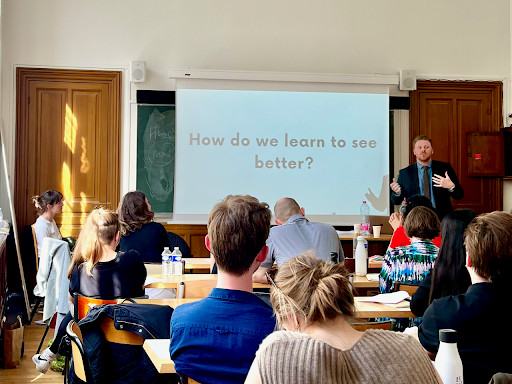In April 2024, I attended the international conference "Iris Murdoch: Literature and Philosophy in Dialogue" held at the Sorbonne. The conference featured scholars from around the world presenting research on the philosophical and literary writings of Iris Murdoch. I was privileged to present my paper “Moral Understanding in Iris Murdoch’s Work." The session including my paper was scheduled like a plenary, meaning it was the only session on the program for its time slot. As such, I was able to benefit from a large audience full of scholars of various levels, including acclaimed philosophers like Sabina Lovibond (whose work I cited in my talk). My talk went well and I received dozens of insightful questions from the audience. The two-day conference also provided me with many opportunities to hear others' presentations, as well as to socialize and dialogue with attendees in informal settings. Some talks that stood out to me included Matthew Congdon's (Vanderbilt) "Murdoch and the New Existentialists," Adham El Shazly's (Cambridge) "Moral Understanding and Humility in Iris Murdoch," and Anil Gomes's (Oxford) "The Constructive Task of a Philosophy of Mind." I was also lucky that my advisor, Megan Laverty, was in attendance (and a presenter herself), and I'm extremely grateful for her guidance and support while at the conference—she introduced me to other scholars, advised me on my talk, and encouraged me afterward. Perhaps the highlight of the trip was discussing philosophy and Murdoch with other conference-goers over beer on the steps of Église Saint-Étienne-du-Mont with views of the Paris Panthéon. I am immensely grateful to the Office of Global Engagement for sponsoring my trip to Paris for my presentation. The things I learned at the conference and the connections made there will, I'm sure, prove to be highly valuable for my work at Teachers College.
Recommendations for students interested in pursuing a similar opportunity, if applicable.
I learned about the conference, as a matter of fact, from Twitter! Later, my advisor, Megan, also mentioned it to me, but it's true that I first heard about it when the Call for Papers poster was circulated on Twitter. The major conferences in a field (like AERA or, for me, APA) are well-known and easy to find, but smaller conferences can be harder to learn about even though they are often more helpful for scholarly development than the 15,000-attendee conferences. To any students interested in finding smaller, more specialized conferences, I would recommend staying aware of CFPs circulated on social media and event websites. In philosophy, many conferences and workshops are advertised on a website called PhilEvents; I would bet that websites like PhilEvents exist for other fields, too. Lastly, do avail yourself of the guidance your advisor can provide. Let them know you're interested in presenting at a conference and ask them if they've heard of any that might be a good fit. Work with them to identify papers/ideas of yours that would be competitive for conferences, and then seek their help in sharpening your proposal ahead of submission.
